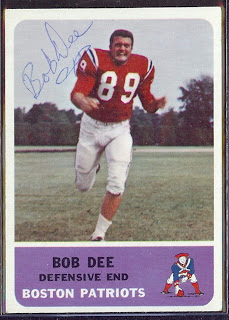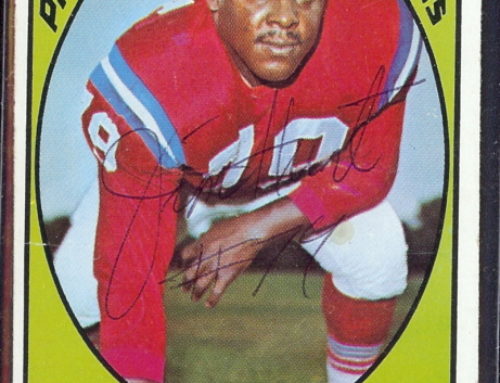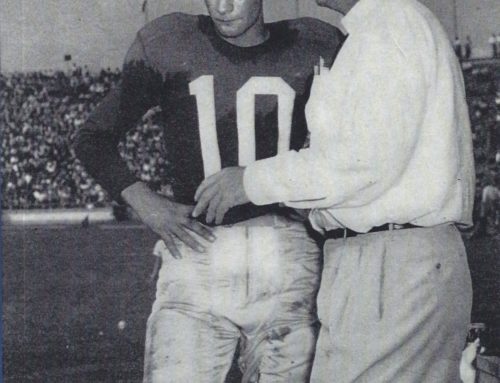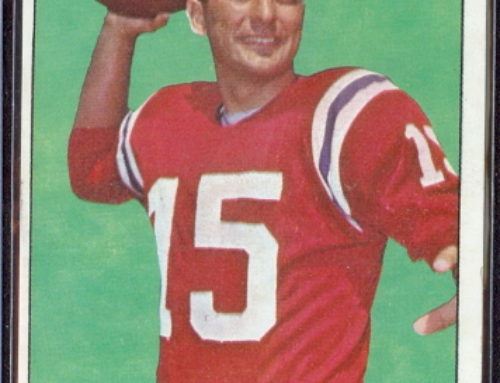>
December has so far been a good month for me in terms of adding autographed football cards to my AFL collections. Three or four deals have come across my desk, each of which allowed me to knock one or two cards off of the dwindling numbers that I still need to complete my autographed card sets from the 1960s. One such card is an autographed 1965 Topps Bob Dee, from the famed “tall boy” set, that I was able to purchase from a trustworthy memorabilia dealer in Ohio. This was the last card that I needed to complete my 1965 Boston Patriots team set, and it got me thinking about Dee and his contributions to the AFL.
Bob Dee was a New Englander through and through, having attended high school in Braintree, Mass., before becoming a three sport letterman at the College of the Holy Cross. He was drafted by Washington Redskins in the 19th round of the 1955 NFL draft, and played for the ‘Skins in 1957 & 1958 before returning to Holy Cross to spend a year coaching the linemen at his alma mater.
The AFL was founded late in 1959, and the City of Boston had an inaugural franchise. Bob Dee came out of his retirement from professional football to play for the hometown Patriots. Dee earned a starting position on Boston’s defensive line, and in fact, scored the first touchdown in American Football League history by recovering a fumble in the end zone when the Patriots beat the Buffalo Bills in the league’s first exhibition game.
Dee’s successes carried into the regular season, where he quickly built a name for himself as one of the top defensive linemen in the new league. Not the largest player at his position at 6’4” and 250 lbs., Dee stressed a finesse game, preferring to overcome blockers with moves rather than through brute force.
From his defensive line position, Bob Dee became one of the stalwarts around which the Patriots built a punishing defense. By 1963, Dee and his defensive mates were a feared squad that forced their opposition to throw the ball because of their solid run defense. Boston also relied heavily on the blitz, sometimes sending their linebackers on a “red dog” more than half of the snaps in a given game.
Dee continued his dominance of the AFL’s offensive linemen through the 1967 season, when he retired due to a business opportunity that was “too good to resist.” Bob Dee left the Patriots as a four-time AFL All-Star who started 112 consecutive games. Years later his number 89 was retired by the Patriots, he was selected as a member of the Boston Patriots All-1960s Team, and he was inducted into the Patriots Hall of Fame.
Bob Dee died of a heart attack while on a business trip in 1979. He was just 45 years old.







>How much is a Bob dee signed card worth?
[…] in 1960, but must not have been highly-acclaimed at the time. Among these are Jim Lee Hunt and Bob Dee in Boston, Mel Branch and Paul Rochester in Dallas, Bud McFadin in Denver, Don Floyd in Houston […]
It depends on the card and condition, but generally speaking in the $35-$55 range.
… [Trackback]
[…] Read More to that Topic: talesfromtheamericanfootballleague.com/the-boston-patriots-bob-dee/ […]
… [Trackback]
[…] Read More on that Topic: talesfromtheamericanfootballleague.com/the-boston-patriots-bob-dee/ […]
… [Trackback]
[…] Read More Information here on that Topic: talesfromtheamericanfootballleague.com/the-boston-patriots-bob-dee/ […]
… [Trackback]
[…] There you can find 20559 more Information to that Topic: talesfromtheamericanfootballleague.com/the-boston-patriots-bob-dee/ […]
… [Trackback]
[…] Read More on on that Topic: talesfromtheamericanfootballleague.com/the-boston-patriots-bob-dee/ […]
… [Trackback]
[…] Read More Information here on that Topic: talesfromtheamericanfootballleague.com/the-boston-patriots-bob-dee/ […]
Cenforce 50 contains the virility drug turn dynamic fixing. Following taking this pill you may get a four to 6-hour erection. It assists you with obtaining tougher sex along with your confederate. The results are utterly apparent after 30-45 minutes.You will notice item clinical knowledge with so much reaching clarifications of the benefits and adverse consequences. This is often a drug that’s like sildenafil and thus, many of us use it to treat barrenness problems. A virility drug fifty mg pill is associate degree oral medication, which can be accessible within the reasonably round-formed pills that are film-covered and blue.
Super Zhewitra is an incredible complete of Sunrise Remedies. Sunrise Remedies is Associate in Nursing Indian pharmaceutical firm headquartered in Ahmedabad. it’s created a reputation for itself within the pharmaceutical export market in precisely fifteen years since its origin. it’s the world’s fastest-growing pharmaceutical maker, retailer, and bourgeois of flavorer formulations, cosmetics, impotence medication, and medicines for ejaculation, with headquarters in India.
… [Trackback]
[…] Information to that Topic: talesfromtheamericanfootballleague.com/the-boston-patriots-bob-dee/ […]
Fildena is presented in one-of-a-kind varieties and dosages, so it is vital to begin with the minimal one tremendous for the therapy of your condition. Discuss the trouble with a certified scientific specialist, point out all the underlying and accompanying illnesses you have, redress you take and comparable details.
… [Trackback]
[…] Read More Info here on that Topic: talesfromtheamericanfootballleague.com/the-boston-patriots-bob-dee/ […]
… [Trackback]
[…] Read More to that Topic: talesfromtheamericanfootballleague.com/the-boston-patriots-bob-dee/ […]
… [Trackback]
[…] There you will find 10136 additional Info to that Topic: talesfromtheamericanfootballleague.com/the-boston-patriots-bob-dee/ […]
Malegra 200 is energetic for spherical 4 hours in your body. It is taken by guys and girls struggling from a type of male sexual sickness recounted as erectile dysfunction. Once Sildenafil receives activated which is typically interior 30 minutes after taking the Malegra 200mg pills, the PDE-5 hormones are inhibited and their secretion is stopped completely.
… [Trackback]
[…] Info on that Topic: talesfromtheamericanfootballleague.com/the-boston-patriots-bob-dee/ […]
… [Trackback]
[…] Find More Info here on that Topic: talesfromtheamericanfootballleague.com/the-boston-patriots-bob-dee/ […]
Prestashop is one of the essential eCommerce CMS stages accessible today. Famous as the key brand, it assists with building unbelievable objections. You can, without an entirely momentous stretch, make your site outstanding through the layouts that are clear for your business. The topic keeps up with PHP and MySQL programming lingo.
These subjects offer a default plan with modules, pictures, and documentation that you can use to plan the association and make a site in your preferred manner. Some prestashop theme are uncommonly valuable to additionally foster the change rate for your web business stores. The multifunctional programming helps with adding any value that you yearn for a central to the best in class eCommerce site.You can buy the prestashop theme by Themevolty .These subjects are incredibly easy to endlessly change, as indicated by your prerequisites for your eCommerce site. You can actually plan and execute these topics, considering the way that Prestashop is an open-source stage.
… [Trackback]
[…] Read More on that Topic: talesfromtheamericanfootballleague.com/the-boston-patriots-bob-dee/ […]
… [Trackback]
[…] Information to that Topic: talesfromtheamericanfootballleague.com/the-boston-patriots-bob-dee/ […]
… [Trackback]
[…] Information on that Topic: talesfromtheamericanfootballleague.com/the-boston-patriots-bob-dee/ […]
… [Trackback]
[…] Find More Info here on that Topic: talesfromtheamericanfootballleague.com/the-boston-patriots-bob-dee/ […]
… [Trackback]
[…] Find More on on that Topic: talesfromtheamericanfootballleague.com/the-boston-patriots-bob-dee/ […]
… [Trackback]
[…] Read More Info here to that Topic: talesfromtheamericanfootballleague.com/the-boston-patriots-bob-dee/ […]
… [Trackback]
[…] Find More Info here on that Topic: talesfromtheamericanfootballleague.com/the-boston-patriots-bob-dee/ […]
… [Trackback]
[…] There you will find 31422 additional Information to that Topic: talesfromtheamericanfootballleague.com/the-boston-patriots-bob-dee/ […]
… [Trackback]
[…] Find More Information here to that Topic: talesfromtheamericanfootballleague.com/the-boston-patriots-bob-dee/ […]
… [Trackback]
[…] Info on that Topic: talesfromtheamericanfootballleague.com/the-boston-patriots-bob-dee/ […]
… [Trackback]
[…] Information on that Topic: talesfromtheamericanfootballleague.com/the-boston-patriots-bob-dee/ […]
… [Trackback]
[…] Read More Info here to that Topic: talesfromtheamericanfootballleague.com/the-boston-patriots-bob-dee/ […]
… [Trackback]
[…] Read More to that Topic: talesfromtheamericanfootballleague.com/the-boston-patriots-bob-dee/ […]
… [Trackback]
[…] Here you can find 51736 more Info on that Topic: talesfromtheamericanfootballleague.com/the-boston-patriots-bob-dee/ […]
… [Trackback]
[…] Read More on that Topic: talesfromtheamericanfootballleague.com/the-boston-patriots-bob-dee/ […]
… [Trackback]
[…] Find More on to that Topic: talesfromtheamericanfootballleague.com/the-boston-patriots-bob-dee/ […]